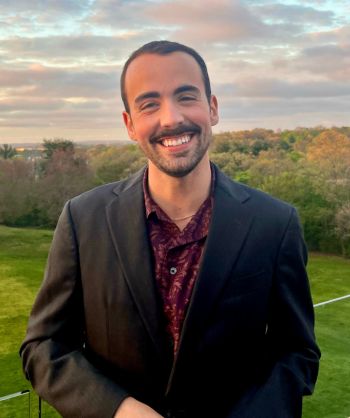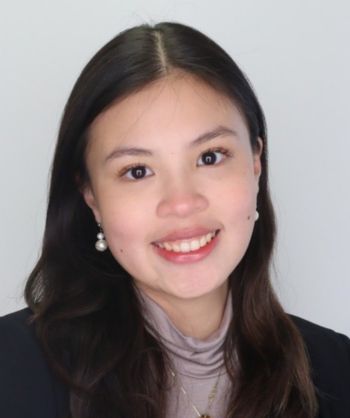 Brandon Páez '24 Brandon Páez '24
Brandon Páez '24 Brandon Páez '24
Brandon Páez '24
Mental Health Counseling

The one piece of advice I would offer to incoming students in the mental health counseling program is to regularly remind yourself of your "why" of being in the program. Graduate school can be difficult at times, but focusing on your purpose for being there can inspire you to continue, with greater passion and energy! It is helpful to connect with others and your professors to share not only knowledge but the experience, together.
Why did you choose the Lynch School of Education and Human Development?
I chose the Lynch School because of its focus on evidence-based practice, alongside its commitment to both social justice and whole person education. Its commitment is central to my understanding that our vocations are not just careers, but ways of being and contributing to the common good.
What is the most impactful course you have taken so far, and why?
The most impactful course I have taken was Grief and Loss. The course discussed how grief, while a universal experience, is particular to each person and may take a myriad of different forms. In mental health counseling, it is essential to understand the many forms of grief and walk alongside others in their grieving process.
 Julianna (Yanna) Garcia '24 Julianna (Yanna) Garcia '24
Julianna (Yanna) Garcia '24 Julianna (Yanna) Garcia '24
Julianna (Yanna) Garcia '24
Mental Health Counseling, Child and Family Mental Health Concentration

The Lynch School provided me with such a diverse education and many opportunities to be able to hone certain skills. I went into the program thinking I was going to do something completely different. After going through the program, I feel that my experience empowered me to be able to make my own decisions and pursue career paths that would make me feel fulfilled. I had that space to explore myself professionally and who I want to be after grad school.
What have you been doing since you finished the Mental Health Counseling program at the Lynch School?
I accepted a job to be one of the assistant directors of the Gender Relations Center at University of Notre Dame. I'm going to be in charge of healthy relationships initiatives and general GRC educational programming on Notre Dame's campus, while supervising student leaders in our office. Externally from Notre Dame, I'm also working on hopefully getting my license and other certifications as well.
What courses or parts of the program stood out to you?
I think hands down, the biggest influence for me was my practicum and supervision placement course. I had a lab leader in my first year and a supervisor in my second year. Both of those experiences were so transformative for me. I felt so supported in that environment.
In the second year, we used the environment to practice case presentations to evaluate and learn from each other. I really felt like a professional at the point. In that setting, I embraced making mistakes, because I knew my classmates would support me through that, and my supervisor would guide me as well. Hands-down, those were the best experiences I've had in the program.
 Ajsa Mehmedovic '24 Ajsa Mehmedovic '24
Ajsa Mehmedovic '24 Ajsa Mehmedovic '24
Ajsa Mehmedovic '24
Mental Health Counseling

While we are graduate students, we are also so much more than that. I encourage all students to make sure to focus on their personal growth, and self care when receiving higher education. I also recommend making connections with professors in order to soak up all of their wisdom and knowledge.
Where are you currently working and what is your job title? What does this position look like?
I am currently working residentially at Devereux Advanced Behavioral Health for my internship. At Devereux, I am able to work with a variety of neurodivergent clients who have experienced trauma when using different modalities such as TFCBT, DBT and so forth. When working at Devereux, I am able to conduct individual therapy, family therapy, group therapy, while also creating incentive plans, safety plans, and assisting in psychiatric medical appointments.
What other internship experiences have you had so far, and what have you learned from those experiences?
This summer, I have worked as a Group Leader at the therapeutic summer camp with Mass General Hospital called the Aspire Program. For six weeks, I led a group of seven adolescent campers with Autism Spectrum Disorder (levels 1 and 2), as well as other neurodiverse profiles, through daily activities at our therapeutic adventure camp. I implemented support plans, performed therapeutic interventions, created daily curriculum, and collaborated with families and support staff. I also co-led a group of 14 campers on weekly excursions into the community while modeling and coaching appropriate behaviors and emotional regulation.
 Nicole Rivers '24 Nicole Rivers '24
Nicole Rivers '24 Nicole Rivers '24
Nicole Rivers '24
Mental Health Counseling; Child and Family Concentration

Don’t be afraid to reach out to sites outside of the database to see if they accept interns. This is how I found my position at Walden Behavioral Care.
Where are you currently working and what is your job title? What does this position look like?
I am a Graduate Clinical Intern at Walden Behavioral Care in the Braintree location. I work directly with clients and facilitate groups to promote eating disorder recovery and overall mental and physical well being. I also provide nutrition support during meals and snacks throughout the day to help clients overcome the challenges of learning how to properly nourish themselves. I am becoming skilled in Dialectical Behavior Therapy (DBT) and Cognitive Processing Therapy (CPT), a form of trauma therapy.
What do you see as the most rewarding aspect of your current position? What has been a challenge in your current position?
The most rewarding part of my position is getting to witness clients' recovery physically and mentally. When clients progress in their treatment, you get to witness their true personalities come to the surface. A challenge has been seeing clients have no choice but to leave treatment when they do not feel ready due to insurance coverage.
 Lillian Hexter '23 Lillian Hexter '23
Lillian Hexter '23 Lillian Hexter '23
Lillian Hexter '23
Mental Health Counseling

When I was in the MHC program, there was often this narrative about "suffering" in the first few years after graduating, while accruing hours for licensure. I expected to end up in an exhausting job where I'd burn out for a couple years and then, once an LMHC, I'd find something "better." However, my job is truly awesome and rewarding! The pay/benefits are good, work/life balance is encouraged, and I have received incredible training and supervision.
Where are you currently working and what is your job title? What does this position look like?
I am currently working at Boston Post Adoption Resources (BPAR) in Brookline as a Masters-Level Clinician. BPAR is a non-profit specializing in trauma-informed individual and group therapeutic care and culturally sensitive support. We connect people to post adoption resources and educate the public about the impacts of adoption. Through our services, BPAR invites those touched by adoption to join our community in an environment that encourages lifelong healing.
In my position, I work with adopted clients across the lifespan, adoptive and foster parents, and kinship caregivers. My work includes individual counseling, family counseling, and couples counseling.
What do you see as the most rewarding aspect of your current position? What has been a challenge in your current position?
In some ways, working at BPAR is a dream job. I myself identify as a transracial adoptee and being adopted has always been a big part of who I am. When I went into mental health counseling, I think I always secretly hoped that one day, I'd be able to work with adoptees. The most rewarding aspect of my job at BPAR is that I'm able to incorporate my own lived experiences into the therapy work.
While I think our training generally encourages us to use self-disclosure in an extremely limited capacity, I've seen the ways in which sharing parts of my story has been powerful in normalizing and validating my adoptee clients' experiences. The most challenging part of my position is working with kids. I never expected to be a child therapist, but a significant portion of my caseload is kids.
 Guolin Zhang '20 Guolin Zhang '20
Guolin Zhang '20 Guolin Zhang '20
Guolin Zhang '20
Mental Health Counseling

Enjoy what you've learned and love what you will do.
What have you been doing since you finished the Mental Health Counseling program at the Lynch School?
Since graduating from the Mental Health Counseling master's program at the Lynch School, I started a Counseling Psychology Ph.D. program, and am now a third-year doctoral student at Ball State University. My research interests involve the internationalization of psychology, multicultural research competency, and cross-cultural psychology methodologies.
What do you see as the most rewarding aspect of your current position? What has been a challenge in your current position?
The most rewarding aspect would definitely be the abilty to continue studying, especially in areas of my own interest. The challenge of being a doctoral student is having to function in multiple different roles and capacity at the same time.
 Ki Young Song '22 Ki Young Song '22
Ki Young Song '22 Ki Young Song '22
Ki Young Song '22
Mental Health Counseling

What advice do you have for current grad students?
Planning early on where and what you want to do after graduation is essential, as different places have different requirements.
What have you been doing since graduating from the program?
I spent about a year in Seoul, Korea, providing psychotherapy for the international population in Korea. It was a very eye-opening experience with diverse clients and clinicians from all over the world, with different theories and philosophical orientations towards psychotherapy. After that, I worked as a Mental Health Counselor at Boston Medical Center, before beginning my current role as an Associate Therapist at NOCD.
 Gabriel Ezema '19 Gabriel Ezema '19
Gabriel Ezema '19 Gabriel Ezema '19
Gabriel Ezema '19
Mental Health Counseling

I am grateful to my professors at BC for their guidance and support.
What advice do you have for current grad students?
Let your passion shape your profession. Pay attention to what you enjoy doing and let that shape your career trajectory. Clinical work can be stressful, and the stress can be better managed if you enjoy what you do.
What have you been doing since graduating from the program?
For one year after graduating from the Mental Health Counseling program, I worked as an in-home therapist. Now, I'm pursuing my Ph.D. from the University of Wisconsin-Milwaukee. Some of my research focuses on how youth and young adults in Nigeria perceive future job opportunities and how this perception impacts their daily experiences and wellbeing.